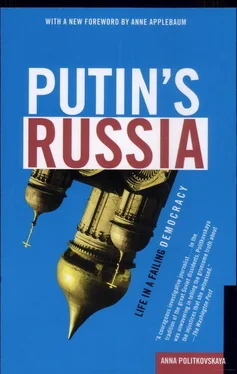Thus, no one in the first category of accused war criminals, whether federal or Chechen, gets a fair trial. After sentencing, Chechen fighters are sent off to remote labor camps and prisons and do not survive for long. Opinion polls show that even those who support the government’s war in Chechnya believe these prisoners are “gotten rid of” at the behest of the authorities. Almost nobody in Russia believes that the judicial system is fair, while almost everybody believes that the judiciary is subordinate to the executive branch.
Then there is the second kind of war criminal: the individual who is in the wrong place at the wrong time, someone run over by the juggernaut of history—not a soldier on either side but a Chechen who becomes a convenient scapegoat. A typical case is that of Islam Hasuhanov. Everything about his story is redolent of Stalin’s purges. Witness statements are beaten out of people; torture and pyschotropic drugs are used to break the will of the accused. This is the hellish path traveled by the majority of Chechens who have found themselves in the torture chambers not only of the FSB but of all the other security agencies rampaging in Chechnya. Individuals were tortured by the henchmen of the late Ahmat-Hadji Kadyrov, who, until his assassination, was head of the pro-Moscow Chechen puppet government; they are tortured in the military commandant’s posts, in pits on the territory of army units, in solitary-confinement cells at police stations.
All these practices are coordinated and managed by the FSB. These are Putin’s people, they enjoy Putin’s support, and they carry out Putin’s policies.
STALIN WILL ALWAYS BE WITH US
The File
Islam Sheikh-Ahmedovich Hasuhanov was born in 1954 in Kirghizia. Beginning in 1973, he served in the Soviet army. He graduated from the Kiev Higher Naval Political College, and in the 1980s served in the Baltic Fleet, and from 1989 in the Pacific Fleet. In 1991 he graduated from the Lenin Political Military Academy, in Moscow. As a submarine officer who had graduated from a military academy, Hasuhanov would have been regarded as the elite of the Russian navy. He retired to the reserves in 1998, with the rank of captain first class, from the position of deputy commander of a B-251 nuclear submarine. From 1998 he lived in Grozny, where he was head of the Military Inspectorate in the government of Aslan Maskhadov and head of Maskhadov’s operational staff. He is married to Maskhadov’s niece, his second wife, and has two sons. Hasuhanov took no active part in the first or the second Chechen war and was never in hiding from the federal authorities. Arrested on April 20, 2002, in the district center of Shali by special units of the FSB as an “international terrorist” and “one of the organizers of illegal armed formations [IAFs],” he was sentenced by the Supreme Court of the republic of North Ossetia-Alaniya to twelve years’ detention in a strict-regime labor camp.
The Prehistory of the Trial
What happens to a man after he is picked up by the FSB? Not the Cheka of 1937, not the Cheka of Aleksandr Solzhenitsyn and the Gulag, but the one funded by today’s taxpayers? Nobody has any hard facts, but everybody is frightened, just as people used to be.
And just as under the Soviet regime, only rarely does any information get out. One of those rare instances is the case of Islam Hasuhanov.
According to the file of Criminal Case No. 56/17, Islam Hasuhanov was arrested on April 27, 2002, on Mayakovsky Street in Shali, and charged under Article 222 of the Criminal Code of the Russian Federation with “being in possession of and bearing firearms.” The wording would lead one to expect some evidence of the alleged weapons.
In fact, armed individuals wearing masks, as is usual in Chechnya, burst at dawn into the house of Hasuhanov’s relatives, where he was living with his family. They dragged him off to an unknown destination without bothering to plant any firearms on him; he had none of his own. The federal special units operating in Chechnya in the search for “international terrorists” have long been confident that they can behave, no matter how despicably, with impunity. This time they were acting on a tip-off from an informer, and had no doubt they were picking up one of the leaders of an IAF whose fate was already sealed. As he would not be surviving, no pistol, no assault rifle was registered as material evidence.
The charge under Article 222 was allowed to stand anyway. The false date of April 27 was also left intact. Missing weeks are characteristic of the antiterrorist operation in Chechnya. A man is arrested and goes missing. The first seven days of his detention are the most brutal. No organization is responsible for him; none of the security agencies admits to knowing anything about him. His relatives search desperately, but it is as if he does not exist. It is during this time that the intelligence services beat everything they need out of him.
Hasuhanov has barely any recollection of the period between April 20 and 27. Beatings, injections, more beatings, more injections. Nothing beyond that. The record of the court hearing ten months after that terrible week states: “For the first seven days I was held in the FSB building in Shali, where I was beaten. Dating from that time I have 14 broken ribs, one rib in my kidney.”
What did the authorities want to get out of Hasuhanov before he died from his injuries? They demanded that he lead them to Maskhadov. [3] Aslan Maskhadov was the leader of the Chechen resistance forces in the current Chechen war. In 1997 he was elected president of the Chechen Republic of Ichkeria, his legitimacy recognized both by the Kremlin and by the Organization for Security and Cooperation in Europe, which sent observers to the elections. In 1999, however, Putin declared Maskhadov to be de facto deposed. Maskhadov responded by heading up the resistance to the occupation of Chechnya by federal troops. He remained on Russia’s most-wanted list and was assassinated in March 2005. Islam Hasuhanov is married to Maskhadov’s niece. He was renowned in Russia as a submarine officer, having served on one of the navy’s elite missile cruisers. On completing his service contract, he was honorably discharged and worked for the Ministry of Defense of Chechnya during the period when Maskhadov was internationally recognized as the legitimate president. The situation did not save Hasuhanov from being sentenced to twelve years in prison—in effect, for working for Maskhadov. As the Supreme Court of the Republic of North Ossetia-Alaniya acknowledged, testimony against Maskhadov was extorted from Hasuhanov during the preliminary investigation by means of barbaric treatment. The record of these court sessions, containing the admission that torture had been used, was subsequently passed to Amnesty International, which continues to work on the case.
After that he could die. The trouble was, Hasuhanov didn’t take them to Maskhadov, and with the robust good health of a submarine officer, he didn’t die, either.
On April 30 it was decided to formalize the case against him. He was dragged off (the public prosecutor of Chechnya at the time was Alexander Nikitin) to a temporary interrogation unit in another Chechen district center, Znamenskaya. This village was blasted from the face of the earth by a female suicide bomber on May 12, 2003. Afterward there was general satisfaction in Chechnya, where most people felt that justice had been done at last. How many people had been tortured there and were secretly buried in the area?
When Hasuhanov arrived in Znamenskaya, he looked like death. His body resembled a sack, but he was breathing. The torture continued under the supervision of Lieutenant Colonel Anatoly Cherepnev, deputy head of the investigative section of the directorate of the FSB for Chechnya. Cherepnev was to be the main investigator in the Hasuhanov case, deciding on the level of torture and directing the process to obtain the required evidence.
Читать дальше





![Stephan Orth - Behind Putin's Curtain - Friendships and Misadventures Inside Russia [aka Couchsurfing in Russia]](/books/415210/stephan-orth-behind-putin-s-curtain-friendships-a-thumb.webp)






